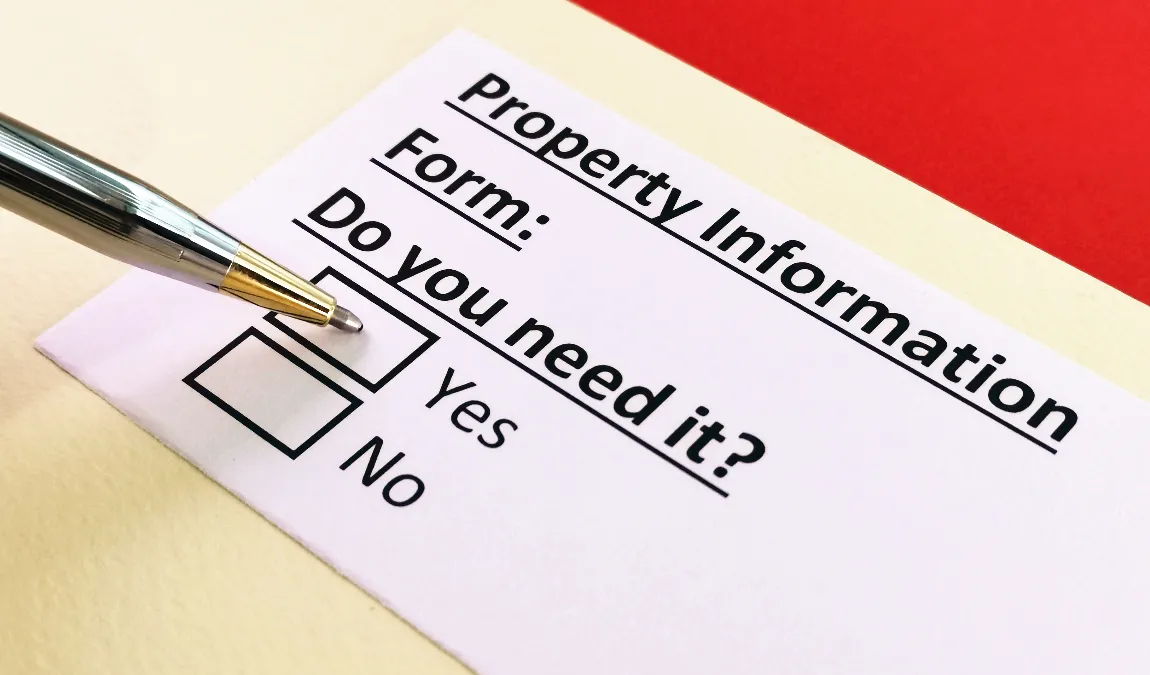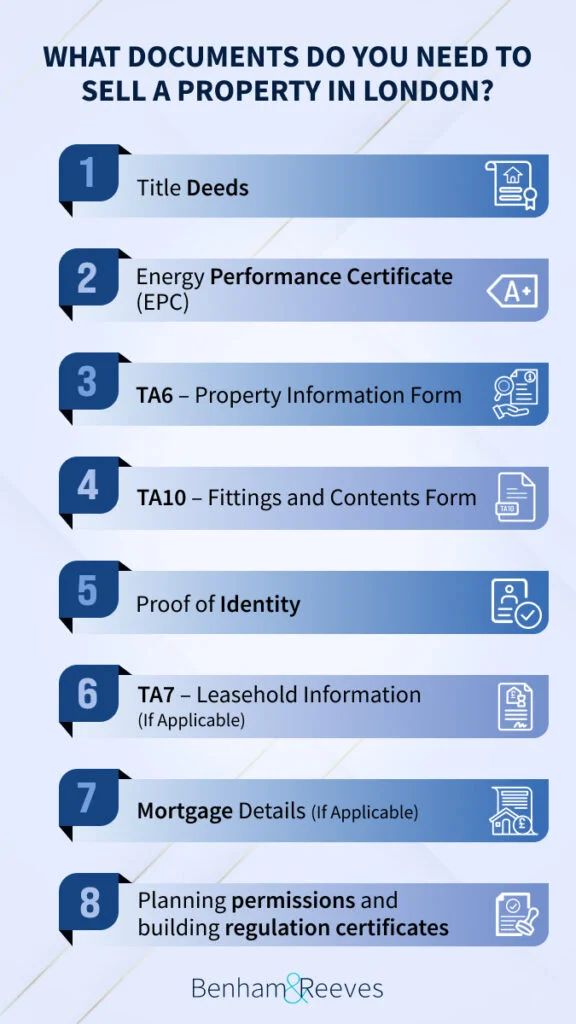- Selling
- Buying
- Landlords
- B&R Landlord hub
- Management services
- Vacant management
- Landlord reviews
- Rental investment
- Furnishing and refurbishment
- Renters’ Rights Act
- Yield calculator
- Free online valuation
- Stamp duty calculator
- ROI calculator
- Landlord resources
- EPC guide
- Video hub
- Area guides
- Fees for landlord
- Lettings Laws
- Why choose Benham and Reeves
- Renting
- New homes
- House prices
- International services
International offices
China, Hong Kong SAR, India, Indonesia, Malaysia, Middle East, Pakistan, Qatar, Singapore, Thailand and Turkey
Learn more - Contact
- News
- Contact
- About us
- My B&R
What documents do you need to sell a property in London?
- Advice clinic
- 13.06.25
- Benham and Reeves
|
Getting your Trinity Audio player ready... |
Contents
- Why are these documents so important?
- When should you start gathering these documents?
- What happens if you misplace some documents?
- How can working with a local estate agent help?
- FAQs
- Q1. Do I need an EPC to sell my property?
- Q2. What is a TA6 form, and why is it important?
- Q3. Can I sell my property without title deeds?
- Q4. What legal checks do I need to pass before selling property?
- Q5. Do I need a solicitor to sell my London property?
- Q6. How long does it take to gather the documents for a sale?
- Q7. Can I sell my home if my documents are incomplete?
When selling a home in London, a seller must disclose certain information to the buyer, including title deeds, EPC certificates, planning permissions, and other relevant paperwork. Let’s look at all the documents required to sell a London property.

1. Title deeds
In the UK, title deeds are essential records that prove legitimate property ownership throughout the conveyancing process. They possess all the required ownership information, including the complete transaction chain and mortgage details. Title deeds can be easily obtained from the Land Registry, even though your instructed solicitor might already have one.
2. Energy performance certificate (EPC)
The energy performance certificate (EPC) reveals vital details about a property’s energy efficiency and potential utility bills a buyer can expect. This certificate can be acquired through an independent energy assessor and is valid for ten years. Read our EPC guide for more information on this document.
3. TA6 – Property information form

The TA6, or Property Information Form, is a detailed questionnaire your solicitor will require you to fill out before putting up a property for sale. Your solicitor must provide this crucial information about the property’s physical and legal aspects, including size, floorplans, warranties, insurance and more to the buyer’s solicitor.
4. TA10 – Fittings and contents form
Buyers are interested in all the add-ons you offer and the property, such as kitchen appliances, bathroom fittings, curtains, etc. This form clearly outlines all of the extras that come with the property.
5. Proof of identity
Government-certified proof of identity, such as a passport or driving licence and relevant address proof, such as a utility bill or bank statement, is mandatory. You must share these documents with your conveyancer and estate agent to comply with anti-money laundering rules.
6. TA 7 – Leasehold information (If applicable)
This document is necessary only if the property you want to sell is leased. It will contain all of the lease’s information, including the ground rent, service fees, freehold owner details, and the state of the property management. It guarantees that the buyer is fully informed about the lease.
7. Mortgage details (If applicable)

To notify the lender of the sale, you must give your solicitor information regarding the mortgage account and any outstanding payments if your property has an active mortgage. The lender will then send a redemption statement with further details regarding the amount owed and the terms of payment.
8. Planning permissions and building regulation certificates
Council approvals are required for structural alterations like balcony additions or extensive remodelling. The buyer has a right to be aware of any such changes you’ve made to the property and to have the supporting documentation.
Why are these documents so important?
Property transactions in London require a high level of transparency to protect the rights of buyers and sellers. These documents have three practical purposes.
i. Legal compliance: Property laws in the UK mandate these documents
ii. Buyer confidence: Buyers have a right to know everything about the property they intend to buy.
iii. Smooth conveyancing: Your solicitor can focus on completing the conveyancing process faster if these documents are readily available.
When should you start gathering these documents?

Having all these documents ready before listing your property for sale is advisable, as this will allow you to be well-prepared when a serious buyer comes along. Also, having most of these documents readily available can fast-track the conveyancing process and help achieve a quicker sale. You can read our detailed seller guide for more tips on selling a property in London.
What happens if you misplace some documents?
Most documents have a digital record; if you misplace any of them, you can easily apply for a fresh copy from the relevant authority.
How can working with a local estate agent help?
We have helped thousands of buyers and sellers, and we understand the complexities of selling a property in the UK capital. Our property experts across 21 London branches have the expertise to see through a sale property sale quickly and efficiently. Our range of services can guide you throughout the entire process, and we offer expert tips and free property valuation. Contact us to learn more about London property investments.

FAQs
Q1. Do I need an EPC to sell my property?
A1. An Energy Performance Certificate reveals a property’s energy efficiency, and sellers are required to provide this document to the buyer.
Q2. What is a TA6 form, and why is it important?
A2. TA6, also known as the Property Information Form, will include all property-related information, such as its size, boundaries, warranties, insurance, etc.
Q3. Can I sell my property without title deeds?
A3. Title deeds are important to prove legal ownership and provide a record of prior ownership history, making it impossible to sell a property without one.
Q4. What legal checks do I need to pass before selling property?
A4. Before selling a property, legal checks such as anti-money laundering and address proof verification are mandatory.
Q5. Do I need a solicitor to sell my London property?
A5. Instructing a solicitor is highly advisable as many legal procedures are involved in selling a London property that a reputed solicitor can do easily.
Q6. How long does it take to gather the documents for a sale?
A6. Gathering all the necessary documents for a smooth property sale can take a few weeks, depending on your solicitor’s and estate agent’s expertise.
Q7. Can I sell my home if my documents are incomplete?
A7. UK property laws are tightly regulated, and to avoid any setback along the way, we recommend having all your documents ready before proceeding with a sale.
Sign up to our newsletter
Subscribe
How much is your property worth?














